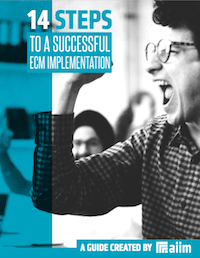The AIIM Blog
Keep your finger on the pulse of Intelligent Information Management with industry news, trends, and best practices.
Data Management | Knowledge Management
Think about your organization for a moment. Is there any employee who doesn't collect, store, transform, analyze, and delete information? We all need information to be successful and help our organizations achieve better business outcomes.
Share
Artificial Intelligence (AI) | Big Data | Data Management | Knowledge Management
What is Generative AI? Generative AI has caught fire in the industry – almost every tech vendor has a ChatGPT-like offering (or claims to have one). They are claiming to use the same technology – a large language model (LLM) (actually there are many Large Language Models both open source and proprietary fine-tuned for various industries and purposes) to access and organize content knowledge of the enterprise. As with previous new technologies, LLMs are getting hyped. But what is generative AI?
Share

Making an ECM implementation successful requires planning and attention to detail. The best way to create the right solution is to identify organizational goals and priorities. Learn how to manage a successful implementation in our free guide.
Knowledge is power - both in our personal lives and work lives. But, in our organizations, the management of this knowledge is one of the most crucial yet overlooked aspects of workplace progress. When employees fail to get access to the knowledge necessary for completing their tasks, the organization can suffer. In fact, there are many benefits to using a practice called Knowledge Management to purposefully manage your organization's knowledge assets and ensure access. Today, we'll be exploring an aspect of Knowledge Management called Expertise Location - the idea, in a nutshell, is to manage knowledge by identifying experts on a particular topic and then leveraging that expertise in support of business goals and objectives. Every company has experts on different topics, and Expertise Location is a way to formalize and easily identify and track where to go to leverage this expertise. Ready? Let's jump in!
Share
The practice of Knowledge Management carries many benefits for your organization, including increased efficiency, better decision-making, improved customer service, and more. With these benefits in mind, let’s get into specific knowledge management tactics you can use to maximize the use of your company’s knowledge assets - six steps you can start working through today! Step 1: Determine What you Need to Know Step 2: Categorize Your Knowledge Assets Step 3: Have Clear Corporate Data Security Policies Step 4: Promote Knowledge Sharing Step 5: Secure Valuable Knowledge Step 6: Get the Right Technology
Share
Quick question: What’s your business’s most prized asset? Is it a tangible asset, like a high-rise building in an upmarket area? Is it owning groundbreaking high-tech tools? What about your inventory, cash, or cash equivalents? In today’s knowledge economy, it's knowledge assets that are vital to a company’s growth. When you think about it, knowledge assets are more important than tangible assets. They can make or break a business. Sadly, many brands ignore knowledge asset management. In this article, we'll explore the benefits of using a strategic practice called Knowledge Management to purposefully manage your organization's knowledge assets. Let’s begin:
Share
This post is focused on the following topics. You may click these links to jump to a specific section:
Share